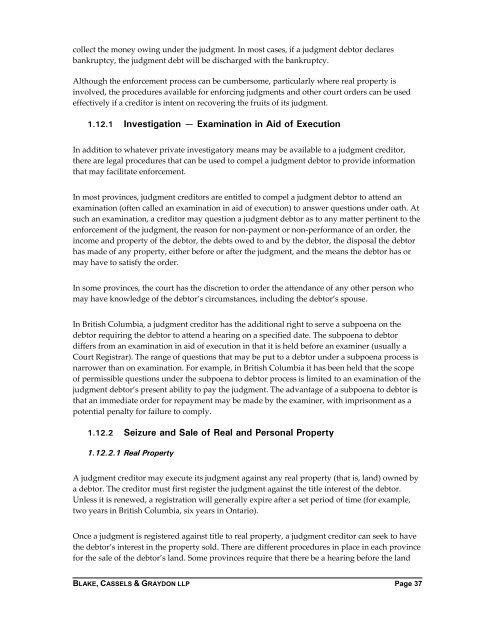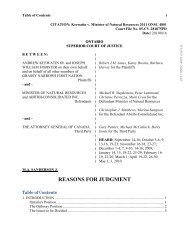Litigation and Dispute Resolution Guide
Litigation and Dispute Resolution Guide
Litigation and Dispute Resolution Guide
Create successful ePaper yourself
Turn your PDF publications into a flip-book with our unique Google optimized e-Paper software.
collect the money owing under the judgment. In most cases, if a judgment debtor declaresbankruptcy, the judgment debt will be discharged with the bankruptcy.Although the enforcement process can be cumbersome, particularly where real property isinvolved, the procedures available for enforcing judgments <strong>and</strong> other court orders can be usedeffectively if a creditor is intent on recovering the fruits of its judgment.1.12.1 Investigation — Examination in Aid of ExecutionIn addition to whatever private investigatory means may be available to a judgment creditor,there are legal procedures that can be used to compel a judgment debtor to provide informationthat may facilitate enforcement.In most provinces, judgment creditors are entitled to compel a judgment debtor to attend anexamination (often called an examination in aid of execution) to answer questions under oath. Atsuch an examination, a creditor may question a judgment debtor as to any matter pertinent to theenforcement of the judgment, the reason for non-payment or non-performance of an order, theincome <strong>and</strong> property of the debtor, the debts owed to <strong>and</strong> by the debtor, the disposal the debtorhas made of any property, either before or after the judgment, <strong>and</strong> the means the debtor has ormay have to satisfy the order.In some provinces, the court has the discretion to order the attendance of any other person whomay have knowledge of the debtor’s circumstances, including the debtor’s spouse.In British Columbia, a judgment creditor has the additional right to serve a subpoena on thedebtor requiring the debtor to attend a hearing on a specified date. The subpoena to debtordiffers from an examination in aid of execution in that it is held before an examiner (usually aCourt Registrar). The range of questions that may be put to a debtor under a subpoena process isnarrower than on examination. For example, in British Columbia it has been held that the scopeof permissible questions under the subpoena to debtor process is limited to an examination of thejudgment debtor’s present ability to pay the judgment. The advantage of a subpoena to debtor isthat an immediate order for repayment may be made by the examiner, with imprisonment as apotential penalty for failure to comply.1.12.2 Seizure <strong>and</strong> Sale of Real <strong>and</strong> Personal Property1.12.2.1 Real PropertyA judgment creditor may execute its judgment against any real property (that is, l<strong>and</strong>) owned bya debtor. The creditor must first register the judgment against the title interest of the debtor.Unless it is renewed, a registration will generally expire after a set period of time (for example,two years in British Columbia, six years in Ontario).Once a judgment is registered against title to real property, a judgment creditor can seek to havethe debtor’s interest in the property sold. There are different procedures in place in each provincefor the sale of the debtor’s l<strong>and</strong>. Some provinces require that there be a hearing before the l<strong>and</strong>BLAKE, CASSELS & GRAYDON LLP Page 37
















